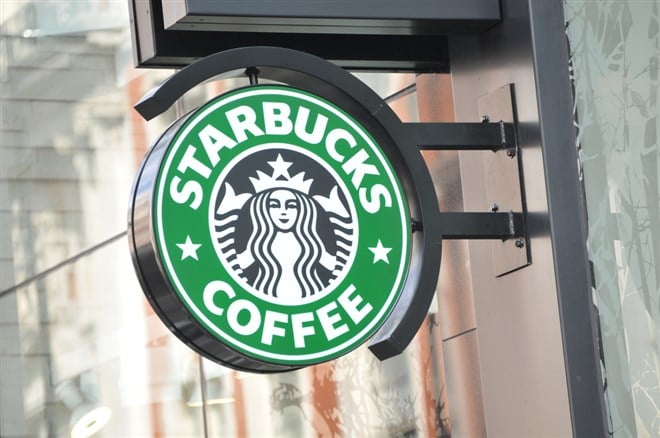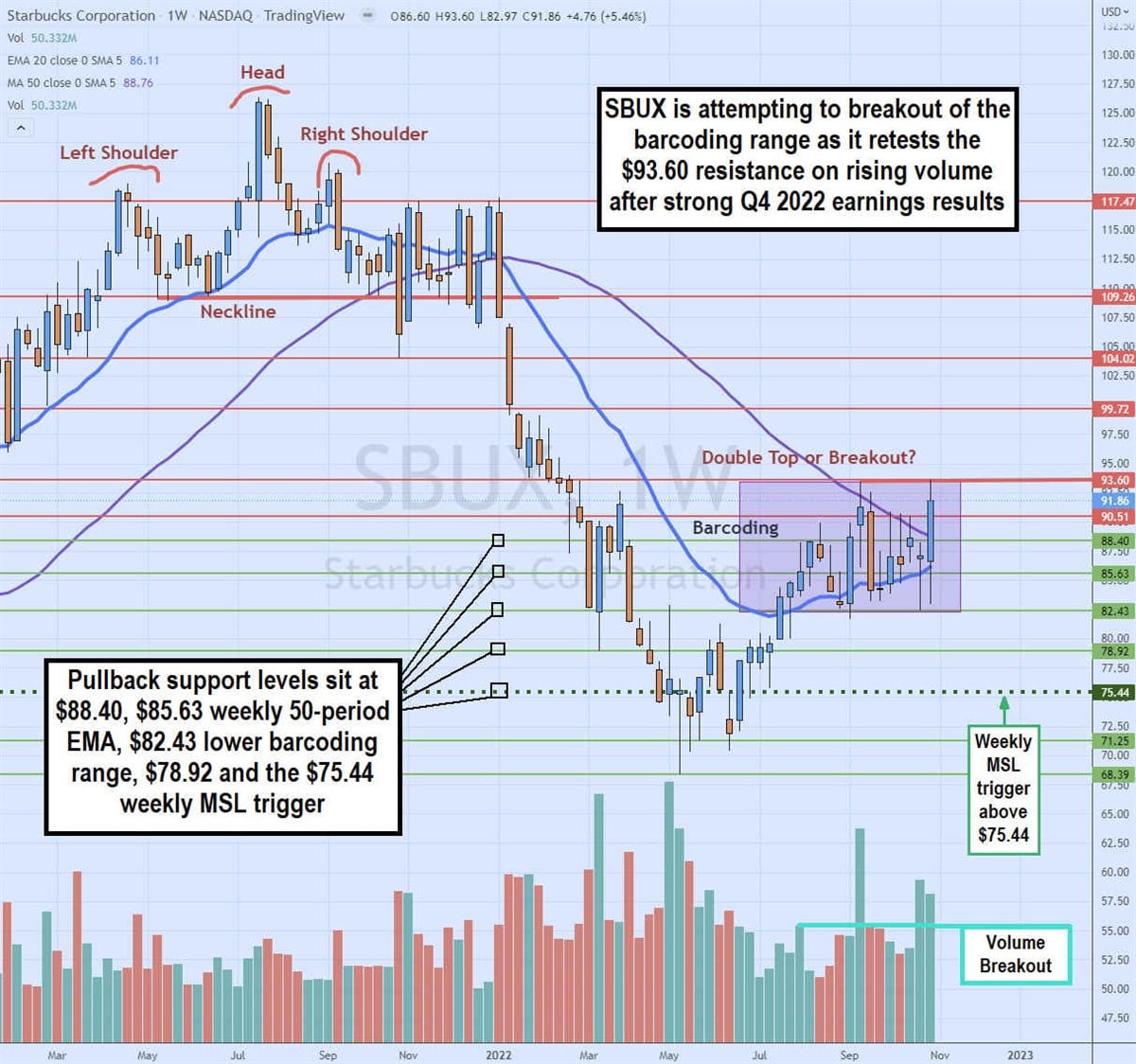 Global coffee products retailer Starbucks (NYSE: SBUX) stock has evolved beyond just coffeeshops as it has expanded to include brands like Teavana, Ethos, Princi, Seattle’s Best Coffee, Evolution Fresh, and Starbucks Reserve under its umbrella. Starbucks has established its brand as a premium offering which customers expect to pay a premium price. Consumers may go to McDonald’s (NYSE: MCD) for cheap coffee but expect to pay more for the premium stock at Starbucks. Even Krispy Kreme (NASDAQ: DNUT) or Dutch Bros (NASDAQ: BROS) can’t match the unlimited customization options for their coffee drinks nor match the massive scale of operations. Starbucks has implemented price increases to outpace inflationary impacts like rising input costs, but with commodity prices receding, Starbucks may return to margin expansion. The loyalty program continued to see growth as Starbucks Rewards made up a record 55% of the sales in its U.S. stores in its latest quarter. Convenience channels including drive-through, mobile order, and pay and drive comprised of 72% of total U.S. sales volume. The Company saw strong demand for its products in every market and every channel in Q4 2022.
Global coffee products retailer Starbucks (NYSE: SBUX) stock has evolved beyond just coffeeshops as it has expanded to include brands like Teavana, Ethos, Princi, Seattle’s Best Coffee, Evolution Fresh, and Starbucks Reserve under its umbrella. Starbucks has established its brand as a premium offering which customers expect to pay a premium price. Consumers may go to McDonald’s (NYSE: MCD) for cheap coffee but expect to pay more for the premium stock at Starbucks. Even Krispy Kreme (NASDAQ: DNUT) or Dutch Bros (NASDAQ: BROS) can’t match the unlimited customization options for their coffee drinks nor match the massive scale of operations. Starbucks has implemented price increases to outpace inflationary impacts like rising input costs, but with commodity prices receding, Starbucks may return to margin expansion. The loyalty program continued to see growth as Starbucks Rewards made up a record 55% of the sales in its U.S. stores in its latest quarter. Convenience channels including drive-through, mobile order, and pay and drive comprised of 72% of total U.S. sales volume. The Company saw strong demand for its products in every market and every channel in Q4 2022.Reinvention Plan
Starbucks founder and interim CEO Howard Schultz had unveiled an aggressive three-year growth reinvention plan to boost revenues by 40% in North America at its September Investor Day event. He expects to open 2,000 new U.S. stores and upgrade existing stores with new equipment and technology with a $450 million investment. The new technology is aimed and significant improving the preparation of customized cold drinks which account for 76% of total U.S. beverage sales. Supply chain and commodity inflationary pressures are expected to continue in fiscal 2023 but to a lesser extent than 2022. While non-GAAP operating margins fell to 15.1% from 19.5% in the year ago period, they still beat consensus analyst guidance for 14.3%. The Company opened 763 new stores to bring the global total stores to 35,711.
Staging a Turnaround
On Nov. 3, 2022, Starbucks released its fiscal fourth-quarter 2022 results for the quarter ending September 2022. The Company reported an adjusted earnings-per-share (EPS) profit of $0.81, excluding non-recurring items versus consensus analyst estimates for $0.72, a $0.09) beat. Revenues rose 3.3% year-over-year (YOY) to $8.41 billion, beating analyst estimates for $8.32 billion. Global comparable store sales (CSS) rose 7%. U.S. and North America CSS rose 11% comprised of 10% increase in average ticket and 1% increase in comparable transactions. International comparable sales fell by (-5%) comprised of (-5%) in average ticket offset by (1-%) decline in comparable transactions. China CSS fell (-14%) driven by (-9%) decline in average ticket and (-6%) decline in transactions. China saw comparable same-store sales drop (-16%) driven by (-17%) decline in comparable transactions partially offset by a 1% increase in average ticket. Non-GAAP operating margin came in at 15.1%, down from 19.5% prior year.

Is the Weekly Downtrend Reversing?
The SBUX weekly chart shows the bearish head and shoulders (H&S) pattern breaking down through the $109.26 neckline in January 2022. Shares continued to cascade lower until finally making a swing low at $68.39 in May. SBUX rallied after triggering the weekly market structure low (MSL) on its breakout through $75.44 and extending the rally up to $93.60 resistance heading into September. Shares fell back down and maintained a chopping or barcoding range between $82.43 and $93.60. Its Q4 2022 earnings propelled shares back up to retest the $93.60 swing high as investors on rising volume. The weekly 50-period exponential moving average (EMA) is rising at $86.11 and tightening the channel with its weekly 50-period MA at $88.76. Pullback support levels to monitor sit at $88.40, $85.62 weekly 50-period MA, $82.43 lower barcoding range, $78.92, and the $75.44 weekly MSL trigger.
Interim CEO Comments
Starbucks founder and interim CEO Howard Schultz commented, “We saw accelerating demand for Starbucks coffee around the world in Q4 and throughout the year. And our Q4 results demonstrate early evidence of the success of our U.S. Reinvention investments. Reinvention will touch, and elevate, every aspect of our Starbucks partner, customer and store experiences, and ideally position Starbucks to deliver accelerated, sustainable, long-term, profitable growth and value creation beginning in 2023,” Schultz added. He added that the Company is seeing early signs of recovery in China but the resurgence of COVID cases has once again resulted in lockdowns and restrictions under the zero-COVID policy.
The Future Looks Brighter
Starbucks issues full-year 2023 EPS guidance of $3.40 to $3.55 versus $3.30 consensus analyst estimates on revenues between $35.48 billion to $36.12 billion versus $35.96 billion consensus analyst estimates. The Company confirmed full-year 2023 global comps to range between 7% to 9% and expects outsized comp for fiscal full-year 2023 after initial negative comp in Q1 2023. U.S. store count is expected to grow by 3% and in China by 13%. Solid margin expansion is expected globally in 2023 as it expects to make over $1 billion in incremental investments. The Company expects to return $20 billion back to shareholders through buybacks and dividends in the next three years.













